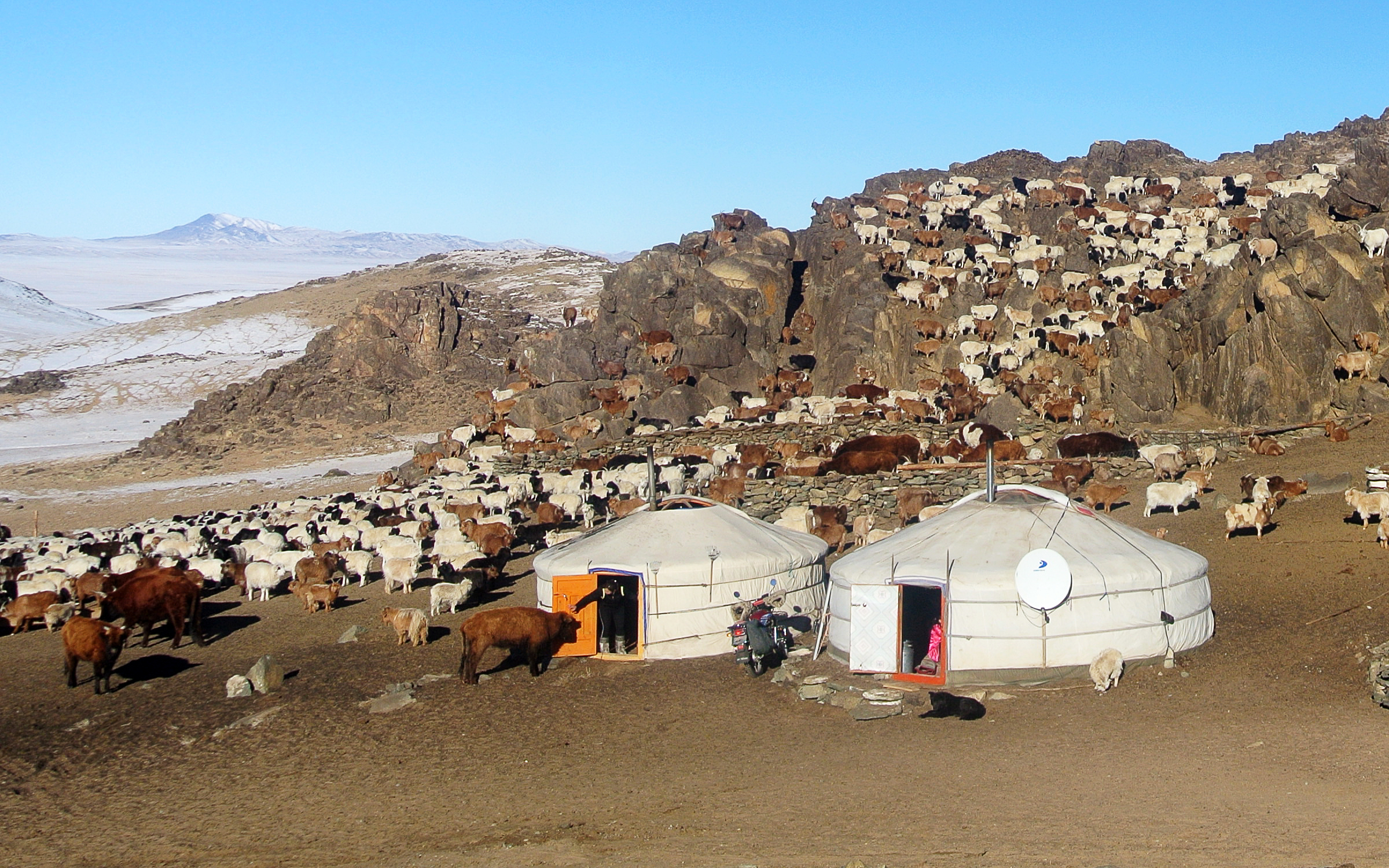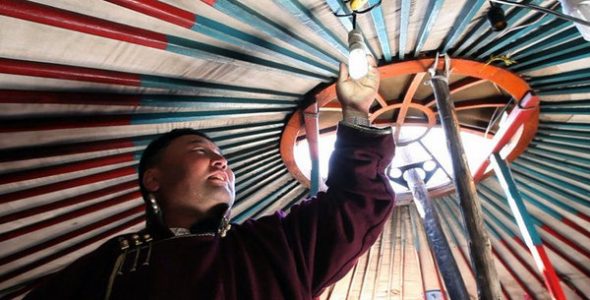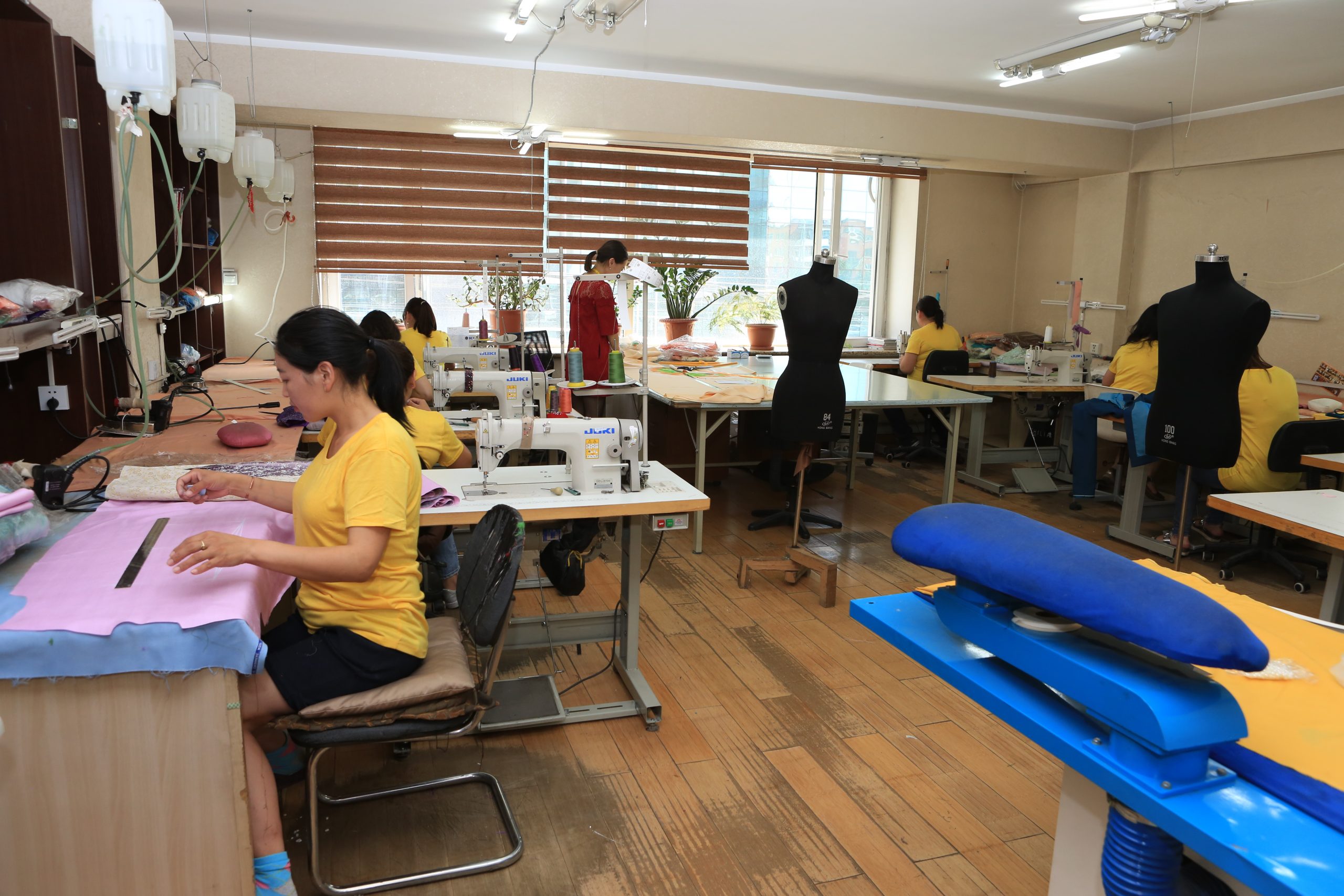Development leaving no one behind

In the countryside, the nomadic herders in the Khanui River valley have settled into their spring site before the boom of the first spring pasque flower and trees. The site instantly captures your eyes. The herders who settled across the steppe are chit chatting and exchanging news whenever they meet each other during livestock herding. Mr. B.Jambal whom we went to see, has been living along Khanui River in Erdenenemandal Soum, Arkhangai Province. He moves his livestock seasonally in search of new pastures.
For over ten years Mr. Jambal used to light candles to make light but now he has solar panels and uses electric lights in his five-wall ger. Outside of his ger, there is a satellite dish and a shiny solar panel. He is delighted to watch TV which is set up in the rear of his ger and listen to news as the harsh winter days are moving away and the spring is approaching with every day. 50-year-old Mr. B.Jambal was one of the herders who benefitted from the National 100,000 Solar Ger Electrification Program in the mid-2000s.
 He remembers “We lived like those in D.Natsagdorj’s poem “Son Of The Old World” when there was no electricity. As we did not have any TV and cell phones, we only heard news from our children who came to visit us from the city. To learn about the price of wool, I would head to the center of soum on my horse. Nowadays, we receive news not only about Mongolia but also the rest of the world through our radios and TVs. We debate about recent events with our neighbours and have video calls with friends and family living far away.” Modern technology is saving time and labor, and herders are also part of it.
He remembers “We lived like those in D.Natsagdorj’s poem “Son Of The Old World” when there was no electricity. As we did not have any TV and cell phones, we only heard news from our children who came to visit us from the city. To learn about the price of wool, I would head to the center of soum on my horse. Nowadays, we receive news not only about Mongolia but also the rest of the world through our radios and TVs. We debate about recent events with our neighbours and have video calls with friends and family living far away.” Modern technology is saving time and labor, and herders are also part of it.
Mr. B.Jambal has a big family with two sons and four daughters. His four oldest children have already reached adulthood and moved to the city. During livestock parturition, J.Dulmaa came to help her parents from Ulaanbaatar where she is studying.
She recalls, “When I was little, we didn’t have any electricity so it was difficult to do my homework at night. Herders have so much to do during the daytime and I had no choice but to study by candlelight at night. But we also had to buy candles from the soum center, so I always tried to save candles and finish my homework as soon as possible.” That is how the 100,000 Solar Ger Electrification Program paved the beginning of modern-age herders.
J.Gantulga is the youngest son of Mr. Jambal. He is a high-school student at a soum school and lives in the school dormitory with his eight-year-old cousin B. Purevee. In the spring, when the livestock parturition begins, the school children will be on their school holidays. During this holiday break, J.Gantulga also brought his cousin to his parents’ home. While he was telling his parents about his friends, school and the dormitory, B.Purvee came into the ger after fencing the calves and joined the conversation. “Our school has lots of books now”, – said B. Purevee. “I have read tons of books and got good grades at school. That is why I was selected as the best student and awarded with a gold medal and gift. What is more, I learned lots of folk stories.”
The conditions of dormitory life in the soum has improved significantly this year and elementary school children like B.Purvee now have access to books, study materials, and even toys. During the weekends or school holidays, children who are unable to go back to their homes would study, do their homework, make handmade crafts, and play games in the study room. Before enrolling in school, B.Purvee participated in the home-based school preparation program which his family believes largely contributed to him becoming one of the best students in his class. During our conversation, Mr. Jambal’s son Gantulga pointed out that these are the results of the World Bank projects for herders’ children’s education.
Livestock parturition season is a time when every herder family works day and night, burning the midnight oil. Owing to his dedication and hard work, Mr. Jambal was selected as the best herder of his soum last year. He said, “Herding provides lots of benefits for the family. It only gets tough during the harsh winter times or dry summers. In the winter of 2010, we lost over 500 heads of livestock and were left with around 200. Now we have over a thousand heads of livestock. However, we put quality of livestock above quantity. A few years ago, we started focusing on improving livestock genetics. As a result, the cashmere output from a single goat increased from 260 to 400 grams. This increase really improved our living.”
When Mr. Jambal wanted to learn more about the livestock insurance, he first received information from his children who live in the city. He then met with insurance company representatives in the soum center to receive more information. Based on this, he concluded that it would be wise to insure their goats which provide cashmere, the main source of their family income. This winter, the livestock loss at the soum level reached six percent so every herder received MNT 500,000 as insurance payment.
Mr. B.Jambal is a socially active man. He not only participates in every activity organized at the soum and province level but also formed a group with around 20 fellow herder households. Last spring at the public meeting, they introduced their project to build a washing facility for sheep and goats, and to dig wells in two bags in Erdene-Uul and Khan-Undur. Their initiative was supported and financed under the Local Development Fund. He says, “We live in good times. This fund, called Local Development Fund which is partly financed by the Sustainable Livelihood Project, can be considered as our money. We are the ones who collectively discuss and decide how to best spend this fund. Recently, the herders in our group started an initiative to repair a wooden bridge in the Khanui River with Local Development Fund financing.”
He mentioned that he wants to set an example for others and help people understand that we can be the solution for our daily challenges. When we were about to go back to the city, Mr. B.Jambal told us about his eldest son who lives in the city and invited us to visit his house. His eldest son J.Gan-Erdene moved to the city when he became a student and ended up settling there. Mr. B.Jambal said that his son has two children and that his wife runs a tailor shop. We told Mr. B.Jambal that we would like to interview his son about microfinancing and publish the interview in our latest edition of our magazine and promised to send him a copy.
 When we entered a door with a sign “Crafty Stitches”, we heard the sounds of busy sewing machines. Neatly arranged sewing threads, Mongolian costumes, shirts, and vests could be seen all around the tailor shop. G.Ariunaa loved designing and sewing since she was little. She started her business in 2014 in her room with only two sewing machines. As years passed, she began to receive more orders and make more profits. Recently, when her youngest child began to go to kindergarten in their district, she was able to focus on her business more. Now she has a manufacturing facility of her own with six tailors. At the beginning, she did not have money to employ others, so her husband used to work on a lockstitch machine after work and on weekends to help her. “At that time, we had no capital but a strong support network and a common goal and dream. Eventually, we decided to expand our business and buy new sewing machines, equipment, and found the courage to apply for a loan for Small Medium Enterprises from Xac Bank,” she said smiling. “As luck would have it, we collected all the necessary documents and property registration from the e–mongolia platform in no time. We even ended up increasing the loan amount by using our car as a collateral. We didn’t know that movable property could be used as a collateral before but nowadays this is possible.” After getting the loan, their income increased twofold, and they hired additional staff.
When we entered a door with a sign “Crafty Stitches”, we heard the sounds of busy sewing machines. Neatly arranged sewing threads, Mongolian costumes, shirts, and vests could be seen all around the tailor shop. G.Ariunaa loved designing and sewing since she was little. She started her business in 2014 in her room with only two sewing machines. As years passed, she began to receive more orders and make more profits. Recently, when her youngest child began to go to kindergarten in their district, she was able to focus on her business more. Now she has a manufacturing facility of her own with six tailors. At the beginning, she did not have money to employ others, so her husband used to work on a lockstitch machine after work and on weekends to help her. “At that time, we had no capital but a strong support network and a common goal and dream. Eventually, we decided to expand our business and buy new sewing machines, equipment, and found the courage to apply for a loan for Small Medium Enterprises from Xac Bank,” she said smiling. “As luck would have it, we collected all the necessary documents and property registration from the e–mongolia platform in no time. We even ended up increasing the loan amount by using our car as a collateral. We didn’t know that movable property could be used as a collateral before but nowadays this is possible.” After getting the loan, their income increased twofold, and they hired additional staff.
Her husband Mr. J.Gan-Erdene has been working as a heating engineer for around 10 years at the Ulaanbaatar District Heating Company after graduating from university. His oldest son is a fifth-grade student and his youngest son is a first grader. This autumn, with support from the Ulaanbaatar Clean Air Project, his children’s school building insulation was improved and old wooden windows were replaced with vacuum windows to reduce heat loss. J.Gan-Erdene pointed out, “Insulation and heating improvements at old school buildings have various benefits. For instance, children will be able to study in warm and comfortable classrooms in cold winter times. Also, it decreases the energy consumption of school buildings. At the moment, the project team is working on installing underground heating in one kindergarten. As the winter season is approaching, we are loaded with insulation and heating works so I can’t find time to help my wife with her business these days.” Currently he is working on the Ulaanbaatar Clean Air Project on the side of his main job. No wonder Mr. B.Jambal talks a good deal about his oldest son and daughter-in-law, a hard-working young couple.
Our short visit to the two households, one living in the countryside and another in the city, reminded us that, with support from institutions that not only enhance public participation, but also provide information, knowledge as well as financing, improving our livelihoods and fulfilling our dreams is well within our reach.
The livelihood and development of Mongolia with nomadic tradition will depend on both the city and countryside. It would be ideal if people living in the countryside can live abundantly, and city dwellers would help one another. The Government’s long-term policy, effective management and projects supported by the international organizations will play a critical role in the development of Mongolia.